Union Minister Jyotiraditya Scindia : New Sanchar Saathi Mobile App brings telecom security tools directly to the fingertips of every citizen
In a landmark move to enhance telecom accessibility, security, and empowerment across India, the Union Minister of Communications, Sh. Jyotiraditya M. Scindia, today launched a suite of citizen-focused initiatives. Key highlights of the event included the launch of the Sanchar Saathi Mobile App,National Broadband Mission (NBM) 2.0 and the inauguration of the Intra Circle Roaming facilityat DBN Funded 4G Mobile Sites.
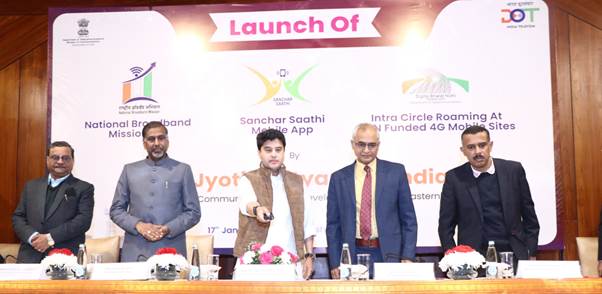
The Sanchar Saathi Mobile App is a user-friendly platform designed to fortify telecom security and empower citizens. While launching the Mobile Application, the Minister highlighted, “This initiative not only provides access to opportunities but also ensures a secure environment for all users.” He emphasized that the Sanchar Saathi App is committed to maintaining the security, safety, and trustworthiness of telecom networks for everyone.


The Sanchar Saathi Mobile App, available for both Android and iOS platforms, provides users with critical tools to secure their telecom resources and combat telecom frauds. Key features include:
· Chakshu – Reporting Suspected Fraud Communications (SFC): Users can report suspected calls and SMS using app and directly from mobile phone logs.
· Know Mobile Connections in Your Name: Citizens can identify and manage all mobile connections issued in their name, ensuring no unauthorized usage.
· Blocking Your Lost/ Stolen Mobile Handset: Lost or stolen mobile devices can be swiftly blocked, traced and recovered.
· Know Mobile Handset Genuineness: The app offers an easy way to verify the authenticity of mobile handsets, ensuring users purchase genuine devices.
With over 90 crore smart phone users in the country, the Sanchar Saathi Mobile App aims to ensure that every individual has access to these vital services with just a few taps on their smartphone.
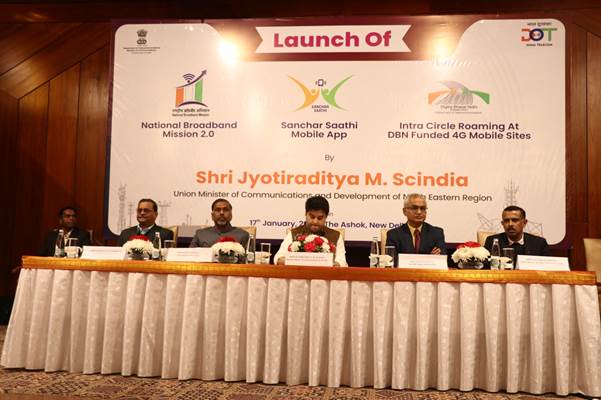
National Broadband Mission (NBM) 2.0
The Union Minister launched the National Broadband Mission (NBM) 2.0 by unveiling its vision document. Shri JyotiradityaScindia highlighted that NBM 2.0 builds on the success of NBM 1.0, under which nearly 8 lakh towers were established. He remarked, “Broadband subscriptions have increased from 66 crore to 94 crore. This growth serves as the fulcrum, the foundation, and the basis for the launch of NBM 2.0.”
The Union Minister further elaborated, “Today, India has emerged as a global leader in both telecom and digital sectors. Over 531 million Indians are now connected to electronic banking. Through UPI, powered by our robust telecom network, we facilitated 172 billion transactions last year, amounting to nearly ₹247 lakh crore. The nation’s growth is intrinsically tied to the strength of our telecom network. It was with this vision that the National Broadband Mission was launched.”
He emphasized that the primary objective of NBM 2.0 is to connect the remaining 1.7 lakh villages across the country and to achieve ambitious milestones. “Our goal is to ensure that at least 60 out of every 100 rural households have access to broadband connectivity. Additionally, we aim to achieve a minimum fixed broadband download speed of 100 Mbps, creating a robust digital infrastructure for rural India,” he added.
From e-governance to disaster management, NBM 2.0 promises to transform every sector and has the potential to spark positive changes nationwide. This initiative is not merely about expanding infrastructure—it is about sowing the seeds for a digitally inclusive future, where connectivity empowers every citizen. As India advances on this digital journey, the mission is clear: to create a connected, resilient, and sustainable India where technology and innovation thrive for the prosperity of all.
The NBM 2.0 aims to propel India into a new era of digital transformation. Aligning with the Hon’ble Prime Minister’s vision of a Viksit Bharat by 2047, it envisions India as a global knowledge society by providing High-speed Broadband and Meaningful Connectivity for all. Building on the success of NBM 1.0 (2019-2024), following will be the key benefits of NBM 2.0:
- Extending operational optical fiber cable (OFC) connectivity to 2.70 lakh villages by 2030 with 95% uptime from ~50,000 as of now.
- To provide broadband connectivity to 90% of anchor institutions like Schools, PHCs, Anganwadi Centre, and Panchayat offices by 2030.
- Improve the Fixed broadband download Speeds- National Average from 63.55 Mbps in November 2024 to a minimum 100 Mbps by 2030.
- To achieve 100% mapping of fiber networks owned by government PSUs by 2026on PM GatiShakti National MasterPlan Platform (PMGS) and use PMGS for planning of Additional Bharatnet project.
- For Ease of Doing Business – reduce the Right of Way application average disposal time from 60 days (now)to 30 days by 2030. In 2019 it was 449 days.
- Increase the number of rural internet subscribers per 100 population from the current 45 to 60 by 2030.
- Achieve the target of powering 30% of mobile towers with sustainable energy by 2030.
- Work on enhancing the usage of the ‘Call Before u Dig’ (CBuD) mobile app to protect underground Telecom infrastructure and other utilities. Hon’ble PM had launched it in March 2023.
- Collaborate with all stakeholders viz. Central Ministries and departments, States, UTs and municipalities to ensure the effective implementation of theNew RoW Rules 2024, issued under the Telecommunications Act, 2023.
- To facilitate rollout of the 5G network, in nook and corner of the country and forfuturistic networks of 6G, work to create a robust, ready to use street furniture infrastructure across the country.
- To work with all stakeholders for Common/Shareable telecom ducts and utility corridors in all linear projects toimprove the maintenance and cost efficiency of telecom networks and other utilities.
- Leveraging Power Sector Assets Such as Optical Ground Wire (OPGW) for enhanced Broadband Connectivity and to improve broadband network reliability, survivability and resiliency during disasters, wars, and other emergencies, in far-flung, remote and hilly regions of the country, where traditional infrastructure might be challenging to deploy.
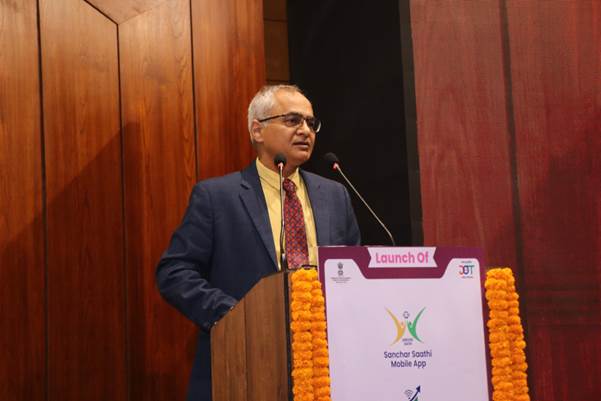
Intra Circle Roaming at DBN funded 4G Mobile Sites
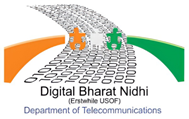
Digital Bharat Nidhi (DBN), earlier known as USOF, has undertaken an important role in bridging the telecom gap across rural and remote areas through its extensive mobile tower projects. The telecom towers funded by DBN in such difficult areas are catering to the subscribers of the specific TSP who has installed the mobile tower with DBN funding. So far, Subscribers of other TSPs do not get the benefit of the DBN funded tower.
During the event, the Union Minister also inaugurated Intra Circle Roaming (ICR) at DBN-funded 4G mobile sites. He emphasized the significance of this initiative, stating, “This is a crucial pillar, with three of our TSPs – BSNL, Airtel, and Reliance – joining forces to leverage each other’s infrastructure at all DBN-funded sites. With nearly 27,836 such sites, we are ensuring not only connectivity but also providing customers across the country with the freedom of choice.”
ICR between TSPs at DBN funded 4G mobile sites will enable subscribers of multiple TSPs to enjoy 4G services from a single DBN funded tower instead of having multiple towers for the various TSPs. Therefore, more subscribers are benefited through a lower CAPEX investment of the operators and Government. This initiative promises seamless 4G connectivity for over 35,400 rural and remote villages served by approximately such 27,000 towers.
Highlighting the citizen-centric initiatives of the Department of Telecommunications, Secretary (Telecom), Dr.Neeraj Mittal, emphasized that the Sanchar Saathi Mobile Application will empower individuals and enhance collective efforts to curb the menace of scams. He pointed out that the Intra Operator Roaming on DBN funded sites will especially be useful for those in remote regions of the country.
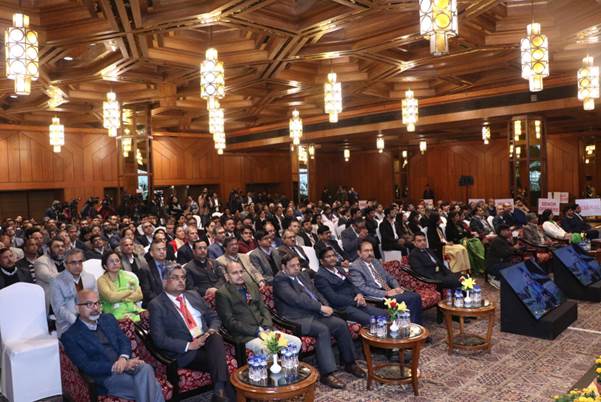
The event was also graced by Secretary (Telecom) and Chairman Digital Communications Commission (DCC),Dr. Neeraj Mittal; Member (Services) DCC Shri Rohit Sharma, and Member(Technology) DCC,Shri Sanjeev K Bidwai, Additional Secretary (T) Shri Gulzar Natarajan and other dignitaries from different Ministries and department of Government of India.
About SancharSaathi

Among several citizen-centric initiatives of the DoT, the Sanchar Saathi Initiative achieved notable success. Launched in May 2023, the Sanchar Saathi Portal(www.sancharsaathi.gov.in) has made significant strides in combating cyber frauds, achieving remarkable milestones such as over 9 crore visits, disconnection of 2.75 crore fraudulent mobile connections, and securing over 25 lakh lost or stolen devices. Additionally, 12.38 lakh WhatsApp accounts linked to cybercrimes have been disengaged, and 11.6 lakh mule bank accounts have been frozen to prevent financial fraud. Furthermore, the DoT introduced the International Incoming Spoofed Calls Prevention System, which has proven to be highly effective in tackling cybercrimes involving spoofed calls. This system, which was launched last year, has blocked 90% of spoofed calls in just two months, reducing their number from 1.35 crore to just 6 lakhs. These proactive measures have gone a long way in preventing scams such as fake digital arrests, tax fraud, and impersonation of law enforcement, thereby protecting citizens from cyber threats.
The DoT’s Digital Intelligence Platform, supporting over 520 organizations including central security agencies, state police, I4C, GSTN, Banks, Telecom service providers, SEBI, CBDT, DGGI, IB, CBI, WhatsApp, etc, has significantly contributed to combating cybercrime. Its collaborations with law enforcement agencies, financial institutions, and telecom service providers have bolstered national telecom security.
These initiatives reflect the DoT’s dedication to bridging the digital divide and advancing India’s global digital standing.
About NBM 1.0
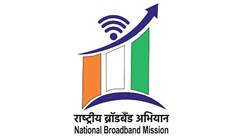
The Mission is part of the National Digital Communications Policy, 2018. The vision of the Mission is to fast-track growth of digital communications infrastructure, bridge the digital divide, facilitate digital empowerment and inclusion, and provide affordable and universal access of broadband for all. The mission is also aligned with the government’s broader vision of improving access to education, healthcare, and e-governance services, fostering economic opportunities, and enhancing social inclusion through digital connectivity.
Key achievements of NBM 1.0 include:
· Expansion of Optical Fiber Cable (OFC) networks to 41.91 lakh kilometers by September 2024.
· Growth in telecom towers to 8.17 lakh and broadband subscribers to 941 million.
· Resolving major Right of Way (RoW) issues and streamlining processes through the “GatiShakti Sanchar” portal.
· Introduction of the “Call Before u Dig” (CBuD) mobile app to protect underground telecom infrastructure.
